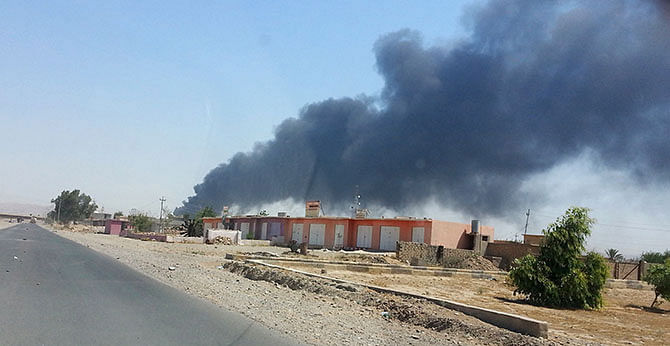Fierce battles for refinery, airport in Iraq

Islamist-led militants and pro-government forces are engaged in fierce battles for the Baiji oil refinery and Tal Afar airport in northern Iraq.
Baiji, Iraq's biggest refinery, is surrounded by the rebels, who say they have seized most of Tal Afar airport.
The fighting comes a day after the US said it would send some 300 military advisers to help the fight against the insurgents.
President Barack Obama stressed that US troops would not fight in Iraq.
US Secretary of State John Kerry is expected to travel to Iraq soon to press for a more representative cabinet, hoping this could ease tensions between the country's rival Muslim sects.
The country's highest Shia religious authority, Grand Ayatollah Ali Al-Sistani, has called for a new government to be set up quickly now the results of recent elections have been ratified.
He said a new government needed to aim for "broad national acceptance" and to "remedy past mistakes".
Correspondents say that will be seen by many as criticism of Iraqi Prime Minister Nouri Maliki.
Maliki has been accused of pursuing anti-Sunni policies, pushing some Sunni militants to join the jihadist Islamic State of Iraq and the Levant (ISIS), which has made rapid advances in recent days.
About 500,000 people have fled their homes in the country's second-largest city, Mosul, which ISIS captured last week.
ISIS says it has downed two military helicopters around the Baiji refinery but this has not been independently confirmed.
The BBC's Jim Muir in Irbil, northern Iraq, says it is thought the militants may have captured part of the vast oil complex.
They have also seized a disused chemical weapons factory in Muthanna, 70km (45 miles) north-west of the capital, Baghdad.
The US says it does not believe the site contains any material that the insurgents could use to make chemical weapons.
But state department spokeswoman Jen Psaki said: "We remain concerned about the seizure of any military site by" ISIS.
Iraq has asked the US for air strikes against the Sunni militants.
Obama said the US was prepared for "targeted and precise military action, if and when" required, but he insisted there was "no military solution" to the crisis.
He also pointedly urged the Shia-led Iraqi government to be "inclusive".
"The United States will not pursue military actions that support one sect inside of Iraq at the expense of another," Obama said.
In addition to sending advisers, Obama said that the US would be increasing intelligence efforts and setting up "joint operation centres in Baghdad and northern Iraq".
On Wednesday, the chairman of the US Joint Chiefs of Staff, Gen Martin Dempsey, warned that the US military still lacked sufficient intelligence to launch air strikes. He told a congressional hearing that pilots would have difficulty knowing who they were attacking from the air.

 For all latest news, follow The Daily Star's Google News channel.
For all latest news, follow The Daily Star's Google News channel. 




Comments